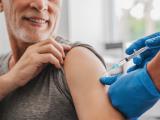Just 26% of US adults say they are concerned that they or a family member may be infected by respiratory syncytial virus (RSV) in the next 3 months, down from 35% last year, while the proportion worried about COVID-19 and flu stayed the same, according to the latest health survey from the Annenberg Public Policy Center (APPC) at the University of Pennsylvania.
Each year, 100,000 older US adults and 58,000 infants and children younger than 5 years are hospitalized for RSV, and 6,000 and 100 or more, respectively, die of their infections, Centers for Disease Control and Prevention (CDC) statistics show.
"It is possible that memories of last year’s winter holiday surge in respiratory illnesses and of the 2022-23 'tripledemic' of Covid-19, flu, and RSV respiratory viruses have faded," Kathleen Hall Jamieson, PhD, director of the APPC and survey director, said in a press release.
Less than half recognized common infant RSV symptoms
Of the 1,744 empaneled adults surveyed last month:
- One in three (33%) worry that they or a family member will contract COVID-19, and 37% are wary of flu.
- Forty-two percent know that RSV can recur, down from 48% last year.
- Forty percent of respondents said they wouldn't recommend RSV vaccination to a pregnant friend or family member to protect their infants, down from 45% last year.
- Over half (54%) either got the RSV vaccine (3%) or say they would likely recommend the vaccine to a friend or family member aged 75 or older or to those aged 60 to 74 (51%).
- A quarter know that RSV can survive for hours on hard surfaces such as tables or cribs, up from 17% last year.
- Only 20% knew that RSV usually produces mild, cold-like symptoms rather than serious breathing difficulties (while 44% thought the opposite, up from 36% last year).
- A total of 43% accurately said it's possible to have and transmit RSV while asymptomatic.
- Less than half of respondents recognized some of the most common infant RSV symptoms (eg, wheezing [48%], decreased activity [39%], runny nose 37%]).
Increased awareness of role of RSV vaccines for babies
The results show an increasing awareness of the importance of RSV vaccines for infants, according to Laura Gibson, PhD, an Annenberg senior data analyst. "If this translates into increased immunization rates, we could reduce their hospitalization rates," she said.
The CDC recommends that all adults aged 75 and older receive a dose of RSV vaccine between August and October, as should those aged 60 to 74 at risk for severe infection. Similarly, pregnant women should be vaccinated at 32 to 36 weeks' gestation between September and January; their infant will be protected for about 6 months. Infants younger than 8 months old can receive the RSV monoclonal antibody nirsevimab (Beyfortus) between October and March.




















